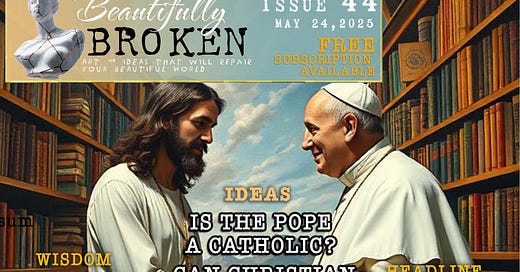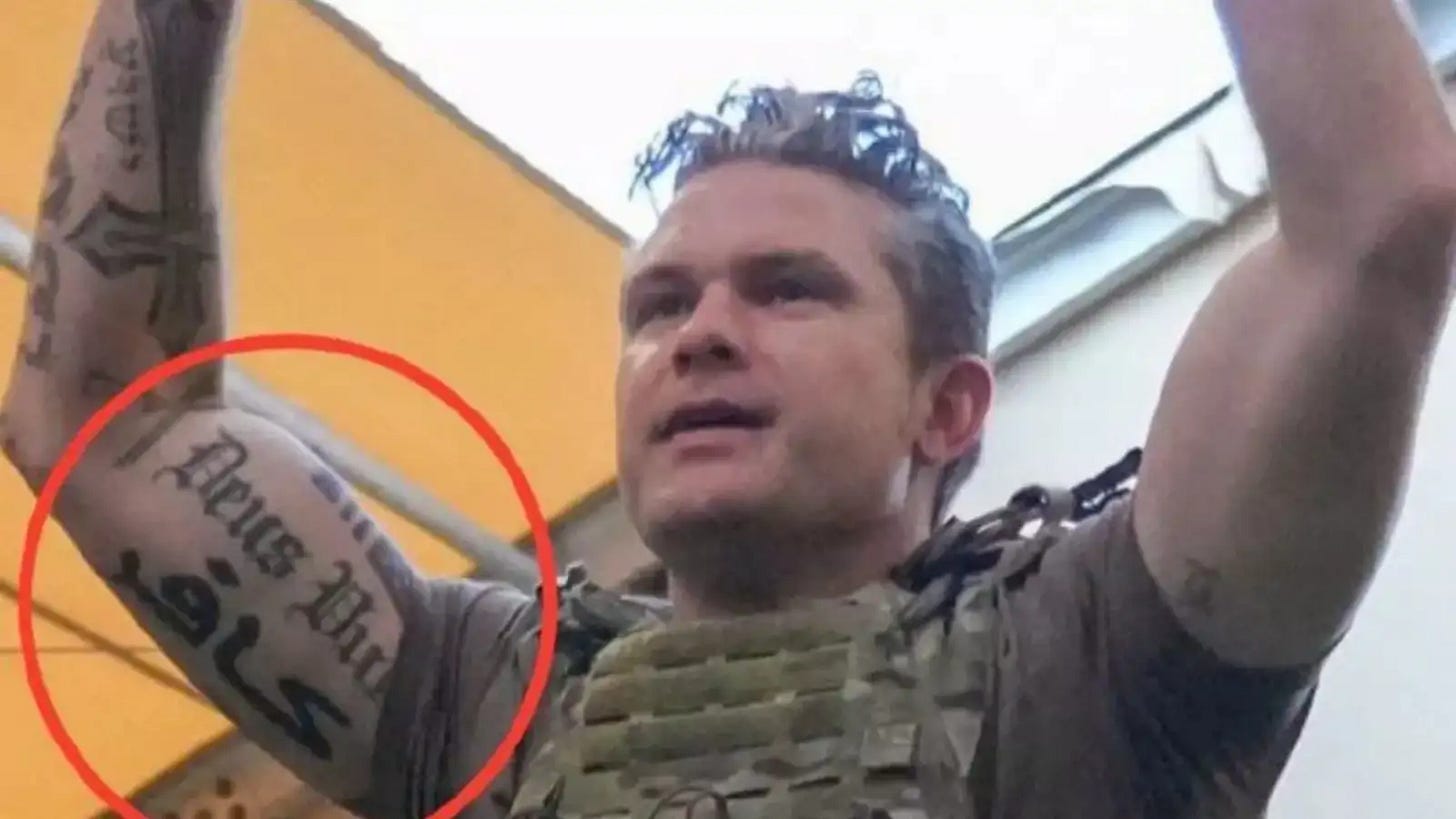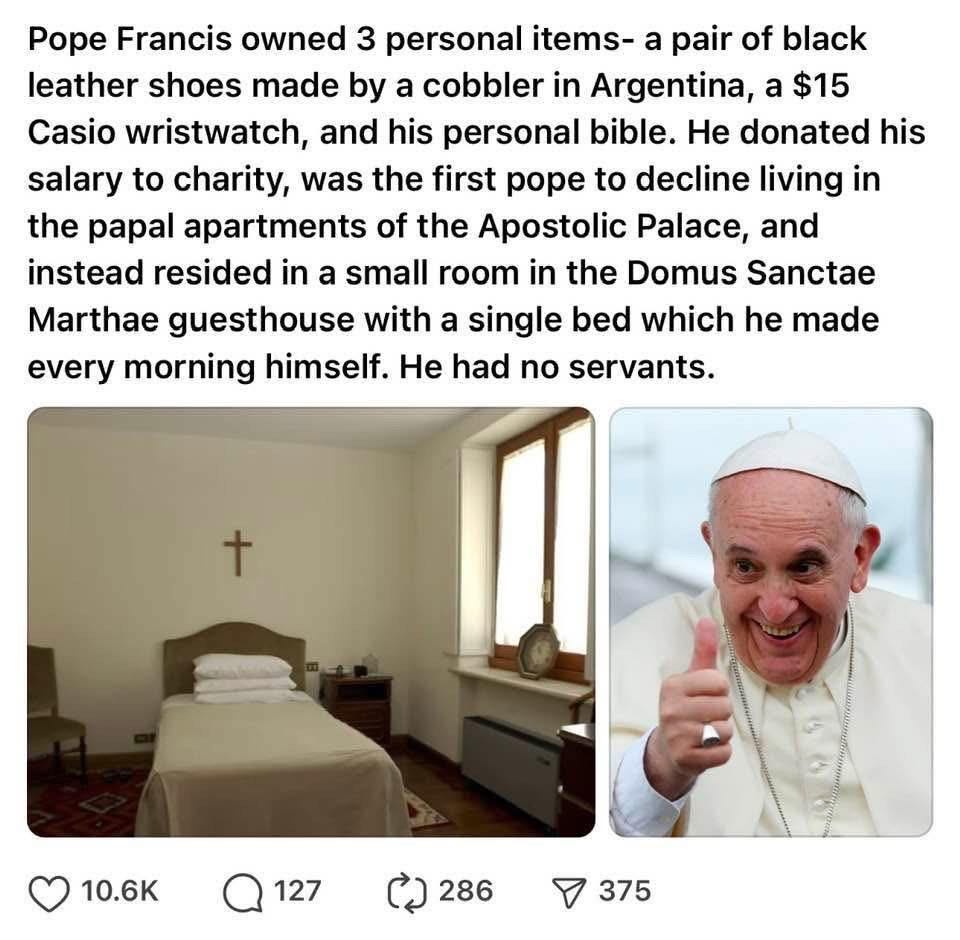Beautifully Broken Issue #44: Is The Pope A Catholic? Can Christian Spirituality Heal A Broken World?
IDEAS, ART & WISDOM TO REPAIR OUR BEAUTIFUL WORLD
Welcome to Beautifully Broken Issue #44: Is The Pope A Catholic? Can Christian Spirituality Heal A Broken World?
Editorial :
Dear Readers,
This week a subscriber referred to Beautifully Broken as advocating for “the radical middle”, a comment which I liked very much.
Middle because the midpoint is where we have balance and perspective--it's a mystical place where we can unify and heal opposites in conflict in our lives and in the world.
Radical because the the ideas and model proposed in Beautifully Broken are unorthodox, counterintuitive and little discussed in the West as realistic solutions even though they are present in the Christian tradition.
In the West and especially in its most powerful culture, America, people are not fond of patience, inaction, listening, giving up something in the short term to gain something in the long term. These ideas, prevalent in Asian culture and the Taoist and Buddhist traditions, have been made into nonsense words in the West. When it comes time to take action and make decisions the idea of peace and compromise are replaced with ideas of winning and taking. The history of the Christian church is also filled with incidents in which the teachings of its founder were ignored or selectively glossed over for material gain:
“If you want to be perfect, go, sell your possessions and give to the poor, and you will have treasure in heaven. Then come, follow me.” Matthew 19:21 (NIV)
“Put your sword back in its place,” Jesus said to him, “for all who draw the sword will die by the sword.” Matthew 26:51–54 (NIV)
Contrast these teachings of Jesus with St. Bernard of Clairvaux’s speech to launch the Second Crusade in 1144:
“Fly then to arms! Let a holy ire animate you in the fight, and let the Christian world resound with these words of the prophet, ‘Cursed be he who does not stain his sword with blood! (Old Testament, Jeremiah 48:10)’ …But God has considered the sons of men, to open for them the road to His mercy. His goodness has caused to dawn for you a day of safety by calling on you to avenge His glory and His name…Christian warriors, He who gave His life for you, today demands yours in return.
“Put the sword back in its place” became “fly then to arms” and the vast crowd who had gathered to hear Bernard were animated by his rallying speech and loudly cried out for some time:
Deus vult! Deus vult! (God wills it)
Ironically, these same words are tattooed on the bicep of Pete Hegseth, the current United States Secretary of Defense, which goes to show that bad ideas die hard and that once someone in authority opens the door to wrongdoing (even if it was a thousand years ago), others will happily follow if it suits their personal agenda. (The Arabic writing below that reads “infidel” or “unbeliever”, presumably in Islam, perhaps a souvenir from Hegseth’s time as a Guantanamo Bay guard).
With that in mind, and with so much global attention focussed on the death of Pope Francis and the election of the American Pope Leo, let's dig into Issue #44 and see what the 21st century leaders of the church have to offer by way of spiritual reunification.
IDEAS: Is The Pope A Catholic? Can Christian Spirituality Heal A Broken World?
As is often the case when a famous public figure dies, the recent death of Pope Francis served to remind us how much he contributed and what he stood for. Sometimes, it’s not until this moment that we realise how much we valued them and the part they played in our collective consciousness.
In Pope Francis’ case I believe he represented the archetype of a good man given high position, doing the best he could to transform the world through kindness while enduring the forces in the world that sought to make a different world—one based on fear and greed (not to mention his opponents within the Vatican itself who mistook his kindness as weakness).
I was invited to Rome in 2016 to celebrate the city’s 2,769th birthday as part of the launch of a science fiction novel I had written with American science fiction actress Claudia Christian (Wolf’s Empire: what if the Roman Empire never fell and expanded into space?). I was staying at a modest hotel in a neighborhood where the latest influx of refugees from the Middle East, Pakistan and Africa had coalesced.
The hotel’s owner, a nice man who had lived for a time in Los Angeles, wasn’t happy about the refugee situation and I didn’t blame him. On one afternoon walk I saw parked cars set on fire, presumably out of boredom. Groups of restless people standing around with nothing to do staring at you when you’re minding your own business isn’t particularly pleasant.
As we chatted, Pope Francis came on the TV and I mentioned that I liked him, that he seemed like a good guy who could genuinely bring some positive change to the world. The hotelier agreed but said he was out of touch with the needs of Romans. The pope had given the refugees the right to sell tickets to Vatican landmarks so they could make some money, and in the hotelier’s opinion this had only exacerbated the problem. He thought they needed to be cleared out of the city, especially from his neighbourhood, as soon as possible.
Considering that the refugees would have come either way, I wondered how much worse things would have been if the refugees were unable to make any money at all?
Sometimes a small opportunity for dignified survival prevents more desperate acts from taking place (mugging, burglary, etc.).
We all want to live in a peaceful, calm environment with a minimum of disruption. At the same time I thought the pope’s gesture was one rooted in compassion and universality —that all people are equal and deserve the right to humane treatment.
Jesus teaches the parable of the Good Samaritan:
“A man was going down from Jerusalem to Jericho, when he was attacked by robbers. They stripped him of his clothes, beat him and went away, leaving him half dead.”
— Luke 10:30 (NIV)
Two religious figures — a priest and a Levite — both see the wounded man and pass by on the other side. But then:
“But a Samaritan, as he traveled, came where the man was; and when he saw him, he took pity on him.”
— Luke 10:33 (NIV)
The Samaritan — considered an outsider and even an enemy to the Jews — bandaged the man’s wounds, took him to an inn, paid for his care, and promised to return.
Also:
“Behold, I am sending you out as sheep in the midst of wolves, so be wise as serpents and innocent as doves.”
— Matthew 10:16 (ESV)
I suppose the idea is that we should be as humane as we can manage in any given situation, tempered by rationality and wisdom.
We must help the refugees, as Pope Francis did, but also solve the greater global problems that are driving the refugees to Rome in the first place.
It’s a tempting fantasy to think that we can revert to a medieval model of fortified kingdoms where each nation can close its borders and just look out for number one.
America is running that experiment at present, and what we’re learning is that the whole world is integrated—from trade supply lines to international banking to instant communication (and very soon real-time vocal translation)— you can’t just disconnect, any more than you can easily disconnect from the internet without taking on a substantial burden of inconvenience (try paying a bill or setting up a service these days with no internet access).
A problem anywhere in the world is everyone’s problem, as we’ve learned when Putin attacked Ukraine and the cost of grain soared.
The Russia-Ukraine conflict is driving food prices higher. Commodities that have been most affected are wheat, maize, edible oils, and fertilizers. Global commodity markets face upside risks through the reduction in grain supplies, higher energy prices, higher fertilizer prices, and trade disruption due to shutting down of major ports. - Miller (The Global Magazine of Milling & Grain) May, 2022
The world is smaller and more tightly knit than ever, and this interconnectivity makes the world a safer and more prosperous place. Nations that rely on one another are less likely to risk war. International trade takes us one step closer to international peace.
Self-interested isolationism will only serve to take a modern country backwards.
Withdrawal from global affairs only creates a vacuum* that other able nations or coalitions are able to fill: e.g., the European Union, China, the BRICS nations (the alternate G8 economic collective comprising China, Russia, India, Brazil & South Africa) and the English-speaking world not including the USA (UK, Australia, Canada, New Zealand).
The new Pope, Leo XIV is an American— a Chicago native and White Sox fan who does the Wordle puzzle every day with his brother.
What an amazing counterpoint to President Trump and his policies designed to transform American into the greatest kleptocracy in human history.
klep·toc·ra·cy | ˌklepˈtäkrəsē |
noun;
a society or system ruled by people who use their power to steal their country's resources: there are too many entrenched dictatorships and kleptocracies in the region.
government by people who use their power to steal their country's resources: the ruling party is highly sensitive to allegations of corruption and kleptocracy by the public.
We saw a kleptocracy in action after the fall of the Soviet Union. The Russian mafia filled the vacuum left by the fall of the communist system. It was a time when private fortunes were made by opportunists who went into business stealing and selling on the black marker the contents of the massive number of unguarded Russian military storehouses spread out across the former USSR.**
We have a similar movement going on now in America with a few differences: it didn’t take a collapse of government and it’s happening in plain sight.
The Democrats are weak and are struggling to present a cohesive opposition and the powerful interests that support Trump are like pigs at a trough in the midst of a feeding frenzy, gobbling up as much as they can before the good times come to an end. The public that support Trump are hanging on and watching a slow motion train wreck in case the accident is miraculously diverted and money falls from the sky and into their lap (spoiler: American author John Steinbeck correctly said “If you’re in trouble or hurt or need—go to poor people. They’re the only ones that’ll help—the only ones.”)
Back to Pope Leo. The current zeitgeist promotes an idea that you can only be happy and confident if you are rich and powerful—the billionaire is the new ideal that we must strive towards. Private jet, million-dollar wrist watch, celebrities to perform at our birthday parties, servants and multiple mansions.
In contrast, the current pope—like the last one—is a poor man. So how can he exude power and confidence? How can he communicate with a culture that increasingly values money as the greatest good?
At this point I’d like to share a deeply personal experience that may throw some light on the motives and thinking of Popes Francis and Leo. Or if it’s too much to say that my experience gives me an insight into the popes, then at least I can confidently claim that it gave me a perspective on Christianity that, at the time, I had abandoned in my own life and therefore may be interesting to you, the reader.
A little over twenty years ago, after a year of meditation and bodywork while living in upstate New York, I had a life-changing spiritual experience.
Keep reading with a 7-day free trial
Subscribe to Beautifully Broken to keep reading this post and get 7 days of free access to the full post archives.






